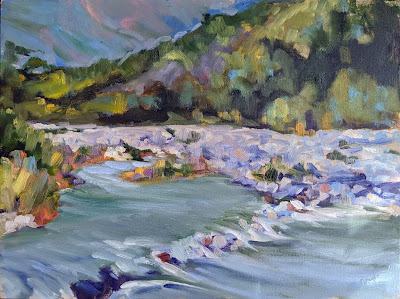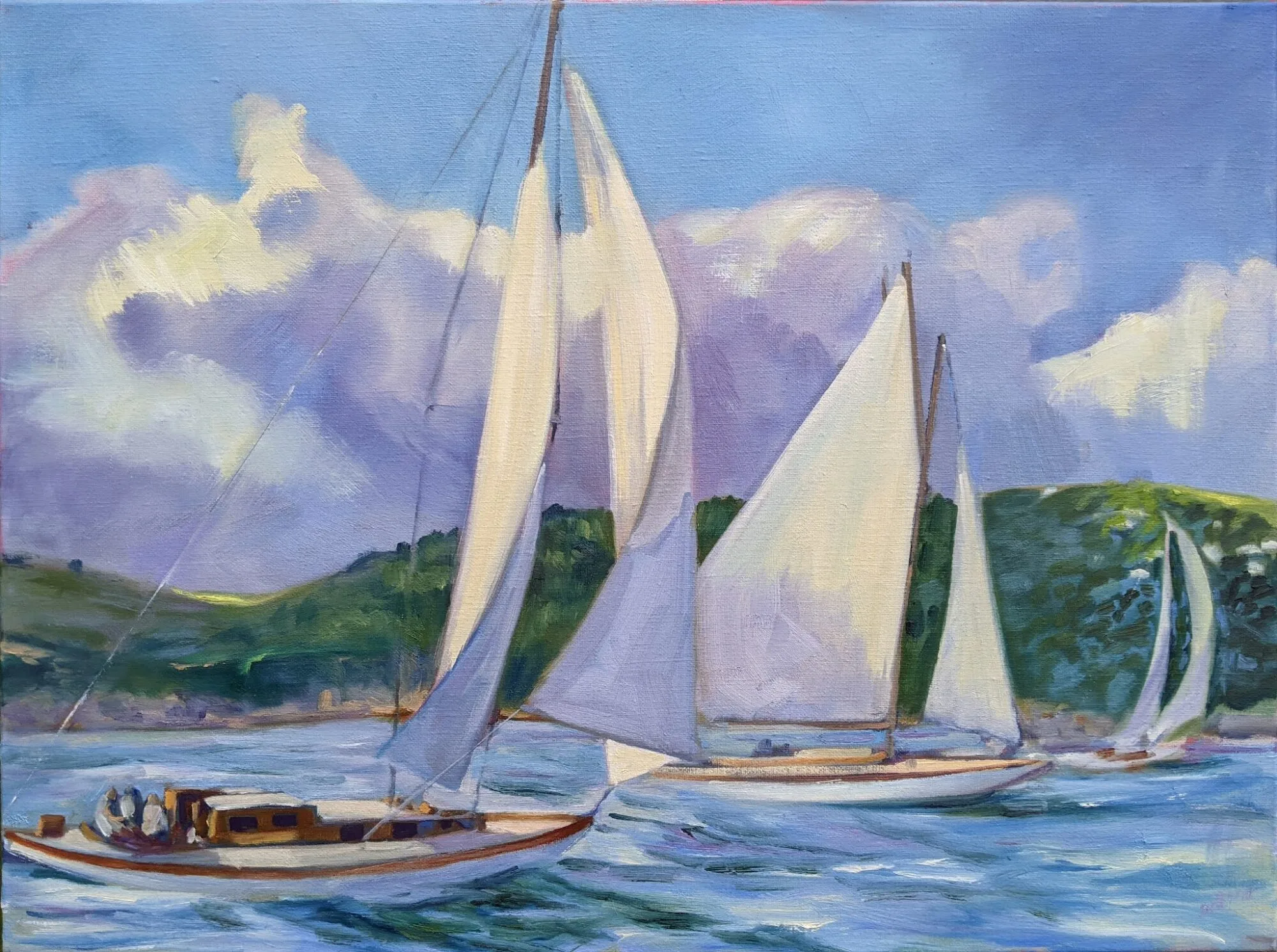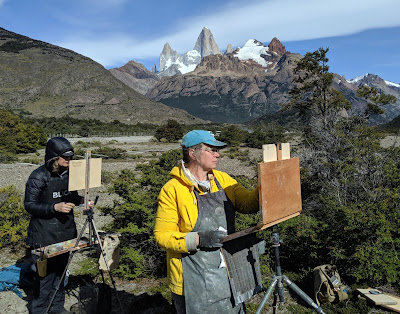Is this ‘The Sound of Music’ or ‘Groundhog Day’?
 |
| Cliffs, by Carol L. Douglas, 12X16, available. |
A
tale of woe from Peru validates our decision to ride out our quarantine here in El Chaltén. Whether the situation there is as dire as the Washington Post makes it sound, I don’t know, but the lead paragraphs are of all parties behaving badly. Our experience couldn’t be more different.
Buenos Aires is a city of 15 million people, where we would be burrs under the saddle of a nation struggling to keep its people safe. Here, we can be what we actually are: harmless painters. I have faith in the world’s economy (although I marvel at the speed at which it’s become unhinged). An important part of that is air travel. Our international travel network will be back, adjusted for coronavirus. And then we will be home.
 |
| Cowpath, by Carol L. Douglas, 9X12, available. |
Meanwhile, even the most peculiar circumstances become habitual when repeated. We eat breakfast together,
Kellee Mayfield takes our temperature, and then we scatter along the Rio Blanco to paint. Luncheon is purely
ad hoc; most of us, I think, are subsisting on caramels, apples, and the remains of a bag of potato chips. Like the Biblical loaves and fishes, those chips survive day after day. At 7:30 we gather for supper, which Cristina, Guillermo, Sergio and Pablo (the only remaining Argentines among us) conjure from supplies.
My husband faces a deadline, so he’s working. It doesn’t matter to him whether he’s in Maine or Patagonia; he can still teleconference and work with his computer in Rochester, NY.
Katie Cundiff is teaching her college classes at
Ringling online. She is seventy years old, but quickly adapting to the idea of teaching online. Every day,
Jane Chapin talks to Dahlia, her new BFF at the American Embassy in Buenos Aires. The time seems to drag for Alexander, who can’t work remotely and isn’t a painter. But we’ve all settled into our routine. “It’s like the movie ‘Groundhog Day,’” Kellee said.
 |
| Cerro Electrico from the path to the National Park, by Carol L. Douglas, 11X14, available. |
Over the weekend, we’ve developed a plan. It involves jerry-cans of gasoline and a seven-hour drive to Rio Gallegos, the capital of Santa Cruz Province, just as soon as we’ve cleared quarantine.
There is just one gas station along the way. This being rural Argentina, it may or may not be open. Against that possibility, Guillermo will supply us with gas, which we’ll stow in Kellee’s car before we leave. “If you can fill up, then leave the cans for someone else,” he said. That’s only one way in a thousand that Guillermo and Cristina have demonstrated their wonderful kindness.
I have one reservation: my scruples have not yet eroded to the point of stealing a car, especially from someone as kind-hearted as Sebastian from Avis. We really must clear this with him first. “I will call,” said Cristina. “But it can wait until Monday.” Panic? None of that here.
 |
| Rio Blanco, by Carol L. Douglas, 9X12, available. |
Today, Guillermo will teach us how to pour from a jerry-can into a gas tank in the inevitable high winds of Patagonia. Apparently, this involves using a one-liter soda bottle as a funnel, but the aperture is cut on the side, not the top. The tires on these cars are nothing to write home about, but each of them has a full-size spare. As we’re leaving at 4 AM, there will need to be a wingman watching for vicuña. They inhabit the biological niche of white-tailed deer in the US: roadkill. “Drive down the middle of the road and follow the line,” said Guillermo.
A note from a friend in the United States gave me calculations on how much toilet paper is necessary to survive quarantine. According to Georgia-Pacific, a 2-person household will need about nine double rolls for 14 days. We are using nowhere near that much. We can’t flush toilet paper here; the septic system isn’t up to it. (This is no surprise; there is very little topsoil here, just glacial till and granite outcropping.) Used tissue goes in a small, lined receptacle that is emptied daily. It’s amazing how much that cuts one’s consumption.
Water, however, is not a problem. There is a cistern at the top of the hill. It serves to pressurize the water system, exactly the same way a water tower works in a city. After inspecting the cistern and marveling at the ingenuity of running plastic lines up the hillside, we set up to paint. There are spectacular views of several peaks and glaciers. On a clear day, you can see to Chile. I couldn’t help it; I broke out into song. The hills are alive with the Sound of Music.











